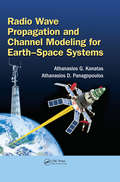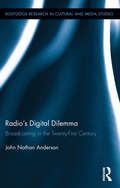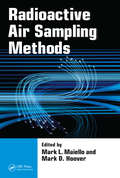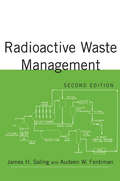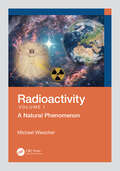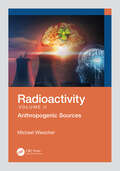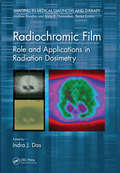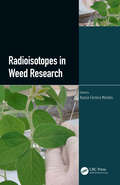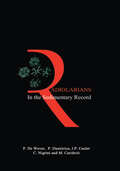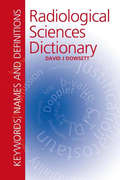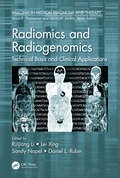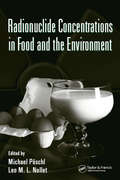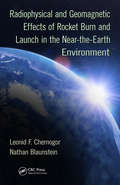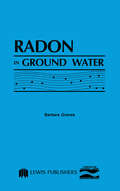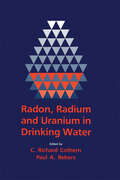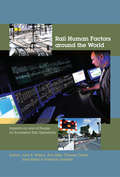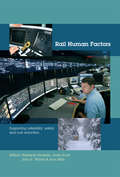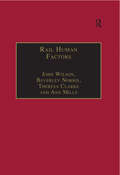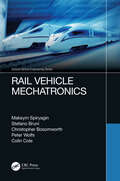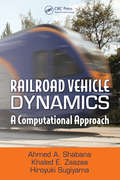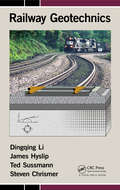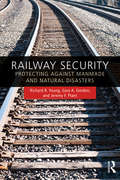- Table View
- List View
Radio Wave Propagation and Channel Modeling for Earth-Space Systems
by Athanasios G. Kanatas Athanasios D. PanagopoulosThe accurate design of earth–space systems requires a comprehensive understanding of the various propagation media and phenomena that differ depending on frequencies and types of applications. The choice of the relevant channel models is crucial in the design process and constitutes a key step in performance evaluation and testing of earth–space systems. The subject of this book is built around the two characteristic cases of satellite systems: fixed satellites and mobile satellite systems. <P><P>Radio Wave Propagation and Channel Modeling for Earth–Space Systems discusses the state of the art in channel modeling and characterization of next-generation fixed multiple-antennas and mobile satellite systems, as well as propagation phenomena and fade mitigation techniques. The frequencies of interest range from 100 MHz to 100 GHz (from VHF to W band), whereas the use of optical free-space communications is envisaged.Examining recent research advances in space-time tropospheric propagation fields and optical satellite communication channel models, the book covers land mobile multiple antennas satellite- issues and relative propagation campaigns and stratospheric channel models for various applications and frequencies. It also presents research and well-accepted satellite community results for land mobile satellite and tropospheric attenuation time-series single link and field synthesizers.The book examines aeronautical communications channel characteristics and modeling, relative radio wave propagation campaigns, and stratospheric channel model for various applications and frequencies. Propagation effects on satellite navigation systems and the corresponding models are also covered.
Radio's Digital Dilemma: Broadcasting in the Twenty-First Century (Routledge Research in Cultural and Media Studies #60)
by John Nathan AndersonRadio's Digital Dilemma is the first comprehensive analysis of the United States’ digital radio transition, chronicling the technological and policy development of the HD Radio broadcast standard. A story laced with anxiety, ignorance, and hubris, the evolution of HD Radio pitted the nation’s largest commercial and public broadcasters against the rest of the radio industry and the listening public in a pitched battle over defining the digital future of the medium. The Federal Communications Commission has elected to put its faith in "marketplace forces" to govern radio’s digital transition, but this has not been a winning strategy: a dozen years from its rollout, the state of HD Radio is one of dangerous malaise, especially as newer digital audio distribution technologies fundamentally redefine the public identity of "radio" itself. Ultimately, Radio’s Digital Dilemma is a cautionary tale about the overarching influence of economics on contemporary media policymaking, to the detriment of notions such as public ownership and access to the airwaves—and a call for media scholars and reformers to engage in the continuing struggle of radio’s digital transition in hopes of reclaiming these important principles.
Radio-Frequency Heating in Food Processing: Principles and Applications (Electro-Technologies for Food Processing Series)
by Juming Tang George B. Awuah Hosahalli S. RamaswamyThis book covers the fundamental science and engineering principles governing radio-frequency (RF) applications and provides a solid understanding of industrial RF unit design options, challenges, and opportunities for development. It explains the similarities, differences, advantages, and limitations of RF and microwave heating; discusses dielectric and thermo-physical properties; provides practical perspectives on industrial RF units used in manufacturing food products; examines RF-heating effects on microorganisms, enzymes, and food quality attributes; and explores RF-heating applications beyond food processing, such as waste treatment and counterfeit prevention.
Radioactive Air Sampling Methods
by Mark L. Maiello Mark D. HooverAlthough the field of radioactive air sampling has matured and evolved over decades, it has lacked a single resource that assimilates technical and background information on its many facets. Edited by experts and with contributions from top practitioners and researchers, Radioactive Air Sampling Methods provides authoritative guidanc
Radioactive Waste Management
by James SalingThis reviews sources of radioactive waste and introduces radioactive decay and radiation shielding calculations. It covers technical and regulatory aspects of waste management with discussion questions at the end of each chapter to provide an opportunity to explore the many facets of waste management issues. An extensive reference list at the end of each chapter retains the references from the first edition of the book and incorporates references used in preparing this revised text, giving readers an opportunity to look at historical records as well as current information.
Radioactivity: A Natural Phenomenon
by Michael WiescherThis book provides an accessible introduction to radioactivity. The first in a two-volume set, this volume is presented in two parts, covering radiation physics and natural radiation exposure.It first explores the discovery and physics of the phenomenon of radioactivity, covering the discovery of radioactive decay and the historical development of the physics and applications of radioactivity through to 1940. Chapters then present descriptive summaries of the physics of the atom and the atomic nucleus, mass and energy conditions, the nature of isotopes, and the different decay patterns. Chapter three discusses decay laws and introduces natural origins of radioactivity as well as methods for producing radioactive isotopes through nuclear reaction processes in reactor and accelerator. The book then provides an introduction on dosimetry, radiation chemistry and impact of radiation on biological systems.The second half of the book details natural radioactivity and the role of radioactivity in the formation of the planetary system and our Earth. The author describes how the inner radioactivity of our planet determines its dynamics and how it could have contributed to the origins of life. The volume concludes with an exploration of the external and internal radioactivity to which humans are exposed and their possible side effects.This book will be of interest to non-science undergraduate and physics graduate students alike, as well as to interested lay-people looking for an introduction to radioactivity. Key Features:- Written in an accessible style, to be understood by readers without a formal scientific education- Highly illustrated throughout- Authored by an expert in the field, drawing from decades of experience in experimental nuclear physics
Radioactivity: Anthropogenic Sources
by Michael WiescherThis book provides an accessible introduction to radioactivity. The second in a two-volume set, this volume is presented in two parts, covering its development and modern applications.It first explores the development and applications of technically enhanced natural radioactivity (TENR) and addresses nuclear energy sources, the fission and fusion processes, and the issues of radioactive fallout from nuclear weapon use and test programs. Later chapters explore the cutting-edge medical applications of radioactive materials in diagnostics and therapy, exploring nuclear medicine technologies such as x-ray tomography, brachytherapy, and positron emission tomography (PET). They also detail the broad range of applications of radioactive materials in industrial production processes, in the sterilization of tools and materials in the medical and the food industries, and in the analysis of art and archaeological material to analyse paintings and painting techniques to identify fakes and forgeries. The book concludes with a discussion of the societal impact and understanding of radioactivity, alongside detailing the underlying reasons for its negative preconceptions and the possible mitigation of these through better education and information practices.This book will be of interest to non-science undergraduate and physics graduate students alike, as well as to interested lay-people looking for an introduction to radioactivity.Key Features:- Written in an accessible style, to be understood by readers without a formal scientific education- Highly illustrated throughout- Authored by an expert in the field, drawing from decades of experience in experimental nuclear physics
Radiochromic Film: Role and Applications in Radiation Dosimetry (Imaging in Medical Diagnosis and Therapy)
by Indra J. DasThis book provides a first authoritative text on radiochromic film, covering the basic principles, technology advances, practical methods, and applications. It focuses on practical uses of radiochromic film in radiation dosimetry for diagnostic x-rays, brachytherapy, radiosurgery, external beam therapies (photon, electron, protons), stereotactic body radiotherapy, intensity-modulated radiotherapy, and other emerging radiation technologies. <P><P>The expert authors address basic concepts, advantages, and the main applications including kilovoltage, brachytherapy, megavoltage, electron beam, proton beam, skin dose, in vivo dosimetry, postal and clinical trial dosimetry. The final chapters discuss the state of the art in microbeam, synchrotron radiation, and ultraviolet radiation dosimetry.
Radioisotopes in Weed Research
by Kassio Ferreira MendesHerbicides are of great importance in weed management and are one of the most widely used pesticide groups for weed control across the globe. Concerns around the residual effects of these intensively used chemicals are equally widespread. Offering a new direction for research that focuses on herbicide behavior and its impacts on the environment, this book covers the use of radioisotopes in weed research and the detoxification of herbicides. Applying technological advances in radiation detection, Radioisotopes in Weed Research explains how isotopic techniques can be used to identify degradation products and trace the fate of herbicides applied to crop plants. This book provides essential information on the historical use and recent advances of radioisotopes in weed research. It demonstrates the potential these methods offer the field of weed science in gaining a better understanding of the behavior of herbicides in plants and soil and working to ensure the continuous, effective, and safe use of herbicides, minimizing harmful impacts on ecosystems. Features: Explains the radiometric method with studies of radiolabelled herbicides and includes case studies as examples Describes radiometric methods to study the behavior of herbicides in soil from transport and transformation to retention Elucidates the absorption, translocation, and metabolism studies of herbicides in plants Authored by a team of leading scientists, this book is written for professors, researchers, extensionists, graduate and undergraduate students, rural producers, and other professionals involved in weed science.
Radiolarians in the Sedimentary Record
by P. De Wever P. Dumitrica J.P. Caulet C. Nigrini M. CaridroitRadiolarians in the Sedimentary Record presents the current state of knowledge on fossil radiolarians. The author discusses the record, as well as new integrated taxonomic systems at the family level. The book provides comprehensive coverage of the fossil record of these unicellular organisms. It also discusses their important role in the history o
Radiological Sciences Dictionary: Keywords, names and definitions
by David DowsettThe Radiological Sciences Dictionary is a rapid reference guide for all hospital staff employed in diagnostic imaging, providing definitions of over 3000 keywords as applied to the technology of diagnostic radiology.Written in a concise and easy to digest form, the dictionary covers a wide variety of subject matter, including:a radiation legislati
Radiology Life Support (RAD-LS): A Practical Approach
by William Bush Jr'Radiology Life Support' focuses on the adverse effects and life-threatening emergencies caused by reactions to the contrast media used in every modern radiology department. Such reactions are relatively infrequent yet can be severe and are therefore difficult to identify and then handle safely without training. All radiologists will experience at least a few such reactions throughout their career. This book teaches proper recognition and treatment of adverse contrast reactions, proper use of sedation and analgesic agents, proper management of an airway in an emergency situation and principle concepts in basic and advanced life support (including early defibrilation). The text is based on the successful training course run by the editors and sponsored by the American Roentgen Ray Society. Adverse reactions to contrast agents are somewhat difficult for physicians without practice to identify and then handle effectively. This volume is a useful aid to the identification process.
Radiomics and Radiogenomics: Technical Basis and Clinical Applications (Imaging in Medical Diagnosis and Therapy)
by Ruijiang Li, Lei Xing, Sandy Napel and Daniel L. RubinRadiomics and Radiogenomics: Technical Basis and Clinical Applications provides a first summary of the overlapping fields of radiomics and radiogenomics, showcasing how they are being used to evaluate disease characteristics and correlate with treatment response and patient prognosis. It explains the fundamental principles, technical bases, and clinical applications with a focus on oncology. The book’s expert authors present computational approaches for extracting imaging features that help to detect and characterize disease tissues for improving diagnosis, prognosis, and evaluation of therapy response. This book is intended for audiences including imaging scientists, medical physicists, as well as medical professionals and specialists such as diagnostic radiologists, radiation oncologists, and medical oncologists. Features Provides a first complete overview of the technical underpinnings and clinical applications of radiomics and radiogenomics Shows how they are improving diagnostic and prognostic decisions with greater efficacy Discusses the image informatics, quantitative imaging, feature extraction, predictive modeling, software tools, and other key areas Covers applications in oncology and beyond, covering all major disease sites in separate chapters Includes an introduction to basic principles and discussion of emerging research directions with a roadmap to clinical translation
Radionuclide Concentrations in Food and the Environment
by Leo M. L. Nollet Michael PoschlAs radiological residue, both naturally occurring and technologically driven, works its way through the ecosystem, we see its negative effects on the human population. Radionuclide Concentrations in Food and the Environment addresses the key issues concerning the relationship between natural and manmade sources of environmental radioactivity
Radiophysical and Geomagnetic Effects of Rocket Burn and Launch in the Near-the-Earth Environment
by Nathan Blaunstein Leonid F. ChernogorRadiophysical and Geomagnetic Effects of Rocket Burn and Launch in the Near-the-Earth Environment describes experimental and theoretical studies on the effects of rocket burns and launchings on the near-the-Earth environment and geomagnetic fields. It illuminates the main geophysical and radiophysical effects on the ionosphere and magnetosphere sur
Radon in Ground Water
by National Water Well Assoc.This new book focuses on sampling and analysis, radon and radium in water supply wells, predictive models, geologic and hydrogeologic controls that influence radon occurrence, monitoring radon and other radioactivity from geologic sources and mining impacts on occurrence of radioactivity in ground water. Also discussed are occurrence, testing, treatment, and reduction of radon from groundwater. Because the most severe health hazard from indoor radioactivity results from inhalation of short-lived radioactive decay products of radon, the EPA scheduled a major conference early in 1987 on Radon, Radium, and Other Radioactivity in Ground Water-Hydrogeologic Impact and Application to Indoor Airborne Contamination. The result is this book.
Radon, Radium, and Uranium in Drinking Water
by C. Richard CothernWith new regulations for radionuclides in drinking water, this volume will be valuable for understanding where radionuclides come from, how their prescence is determined, where humans come in contact with them, health effects consequences (both for individuals and communities), removal from water, disposal problems and cost implications.
Rail Human Factors around the World: Impacts on and of People for Successful Rail Operations
by John R. Wilson Ann Mills Nastaran Dadashi Jane Rajan Theresa ClarkeThe rail human factors/ergonomics community has grown quickly and extensively, and there is much increased recognition of the vital importance of ergonomics/human factors by rail infrastructure owners, rail operating companies, system developers, regulators and national and trans-national government. This book, the third on rail human factors, is d
Rail Human Factors: Supporting reliability, safety and cost reduction
by John R. Wilson Ann Mills Nastaran Dadashi Anita ScottThe rail human factors/ergonomics community has grown quickly and extensively, and there is much increased recognition of the vital importance of ergonomics/human factors by rail infrastructure owners, rail operating companies, system developers, regulators and national and trans-national government. This book, the fourth on rail human factors, is
Rail Human Factors: Supporting the Integrated Railway
by Ann Mills J Wilson B NorrisIn recent years, for reasons connected to the organization of the industry, technical developments, and major safety concerns, rail human factors has grown in importance at an international level. Despite its importance, however, supporting literature has been largely restricted to specialist journal publications and technical reports. Rail Human Factors addresses this imbalance by providing the first fully comprehensive overview of the area. The volume includes contributions from leading ergonomists, psychologists, sociologists, management scientists and engineers whose common theme is to investigate, understand and design for people on the railways, including staff, passengers and the general public. Every area of ergonomics/human factors is covered: physical design of work and equipment in maintenance; cognitive ergonomics in driving, signalling and control; organizational and social ergonomics in the way teams are formed, plans are made and organizations are structured and run. Topics covered include: � Systems views of rail human factors � Driver models and performance � Train and cab design � Network and train control systems, including ERTMS � Signals and signal � SPADS � Signalling and control center design � Signaller performance � Control center interfaces � Workload, situation awareness, team working � Human error and reliability � Timetabling and planning � Maintenance planning and work � Safety climate and safety culture � Passenger comfort and behaviour � Station design � Public information systems � Level crossings � Trespass and vandalism � Ergonomics standards and guidelines � Human Factors integration The book is the definitive guide for all those concerned with making railways safer, more
Rail Vehicle Mechatronics
by Maksym Spiryagin Colin Cole Peter Wolfs Stefano Bruni Christopher BosomworthThis unique and up-to-date work surveys the use of mechatronics in rail vehicles, notably traction, braking, communications, data sharing, and control. The results include improved safety, comfort, and fuel efficiency. Mechatronic systems are a key element in modern rail vehicle design and operation. Starting with an overview of mechatronic theory, the book goes on to cover topics including modeling of mechanical and electrical systems for rail vehicles, open and closed loop control systems, sensors, actuators and microprocessors. Modern simulation techniques and examples are included throughout, and numerical experiments and developed models for railway application are presented and explained. Case studies are used, alongside practical examples, to ensure that the reader can apply mechatronic theory to real world conditions. These case studies include modeling of a hybrid locomotive and simplified models of railway vehicle lateral dynamics for suspension control studies. Rail Vehicle Mechatronics provides current and in-depth content for design engineers, operations managers, systems engineers and technical consultants world-wide, working with freight, passenger, and urban transit railway systems.
Railroad Vehicle Dynamics: A Computational Approach
by Ahmed A. Shabana Khaled E. Zaazaa Hiroyuki SugiyamaThe methods of computational mechanics have been used extensively in modeling many physical systems. The use of multibody-system techniques, in particular, has been applied successfully in the study of various, fundamentally different applications. Railroad Vehicle Dynamics: A Computational Approach presents a computational multibody-system
Railway Geotechnics
by Dingqing Li James Hyslip Ted Sussmann Steven ChrismerLinks Geotechnics with Railway Track Engineering and Railway Operation Good railway track and railway operations depend on good geotechnics, in several different ways and at varying levels. Railway Geotechnics covers track, track substructure, load environment, materials, mechanics, design, construction, measurements, and management. Illustrated by
Railway Security: Protecting Against Manmade and Natural Disasters
by Richard R. Young Gary A. Gordon Jeremy F. PlantThis book provides an overview and assessment of the security risks, both manmade and natural, facing the railways and rail networks. Railroads face significant threats from disasters, but with situational awareness and coordinated effort these can often be substantially minimized. Transportation assets have always been vulnerable to natural disasters, but in the current environment these assets are also a preferred target of human-caused disruption, especially in the form of terrorism, as the events in many other parts of the world have underscored. Railways are not a homogeneous mode of transportation given their various roles in intercity and commuter passenger movement, as well as being a major portion of the freight ton-miles upon which the U.S. economy is highly dependent. Designed to provide advice for railway owners and first responders, this text discusses how to secure hazardous material transport and how to establish guidelines for rail freight operations and rail passenger operations. The book aims to develop an understanding of the unique operating characteristics of railways, the nature and the range of vulnerabilities, the present means for protecting the infrastructure, and the public policy initiatives that are prerequisite for developing a comprehensive appreciation of the magnitude of this issue. The book utilizes case studies of transport disasters to illustrate lessons learned and to provide critical insight into preventative measures. This book will be of great interest to students and practitioners of transportation, technology and engineering, and security management.
Railway Security: Protecting Against Manmade and Natural Disasters
by Richard R. Young Gary A. Gordon Jeremy F. PlantThis book provides an overview and assessment of the security risks, both manmade and natural, facing the railways and rail networks.Railroads face significant threats from disasters, but with situational awareness and coordinated effort these can often be substantially minimized. Transportation assets have always been vulnerable to natural disasters, but in the current environment these assets are also a preferred target of human-caused disruption, especially in the form of terrorism, as the events in many other parts of the world have underscored. Railways are not a homogeneous mode of transportation given their various roles in intercity and commuter passenger movement, as well as being a major portion of the freight ton-miles upon which the U.S. economy is highly dependent. Designed to provide advice for railway owners and first responders, this text discusses how to secure hazardous material transport and how to establish guidelines for rail freight operations and rail passenger operations. The book aims to develop an understanding of the unique operating characteristics of railways, the nature and the range of vulnerabilities, the present means for protecting the infrastructure, and the public policy initiatives that are prerequisite for developing a comprehensive appreciation of the magnitude of this issue. The book utilizes case studies of transport disasters to illustrate lessons learned and to provide critical insight into preventative measures.This book will be of great interest to students and practitioners of transportation, technology and engineering, and security management.
